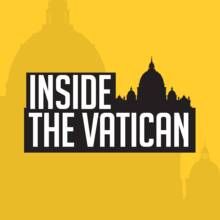Pope Francis’ recent moves to remove Bishop Joseph Strickland from his diocese in Tyler, Tex. and revoke Cardinal Raymond Burke’s salary and Vatican apartment have sent shockwaves throughout the American church and pointed to a long-standing tension between the pope and a small number of vocal critics in the U.S. In this episode of “Inside the Vatican,” host Colleen Dulle is joined by Mike Lewis to understand the pope's motivation behind these decisions, the history and ideology behind this divide between traditionalists and Pope Francis, and how we might be able to bridge that divide.
[Listen and subscribe to “Inside the Vatican” on Apple Podcasts and Spotify.]
Mike is the editor-in-chief of Where Peter Is, a blog site dedicated to helping U.S. Catholics understand Francis’ vision for the church amid intense criticism. Having covered that relationship for years, Mike explains that U.S. Catholics are prone to a rigid, ideological way of thinking that can get in the way of our conceptions of faith and legitimate authority. This tendency can put U.S. Catholics at odds with Pope Francis’ commitment to dialogue and cross-cultural encounter; Mike suggests that to some Catholics, “Pope Francis represents a capitulation to secularizing culture.” Mike encourages Catholics to look at it another way, however: “Our culture has changed, and if we are going to operate and engage within that culture, a defensive and fearful posture simply isn't going to allow the Catholic Church to have a seat at the table in society.”
Mike and Colleen discuss how these tensions have played out across debates over issues like Amoris Laetitia, the Latin Mass, the Covid-19 pandemic, and recently, the Synod on Synodality. They also explore Francis’ moves against certain critics in the hierarchy, including Cardinal Burke and Bishop Strickland. Colleen points out that the Vatican said these were administrative decisions, which complicates the narrative of Francis “showing us where the line that cannot be crossed is,” even though “some might interpret that as Francis looking for a reason to remove them while actually wanting them out because they're critical.” It’s a strained, polarized relationship, and Mike argues that there are steps Francis could take to help bridge this divide. “I don’t doubt the sincerity of Pope Francis’ critics in the U.S.,” Mike explains, and lays out steps the Pope could take to “start a dialogue and to lay out some common ground.”
Links from the show:







